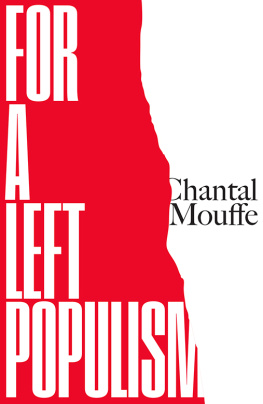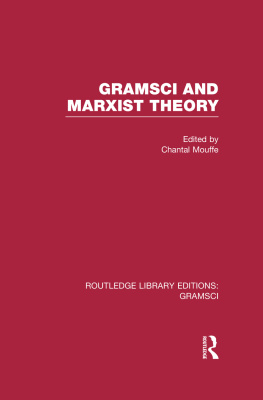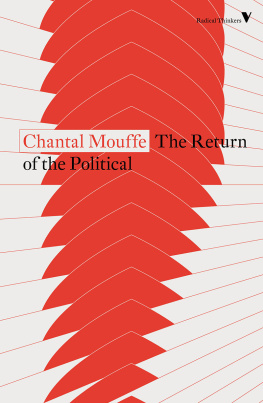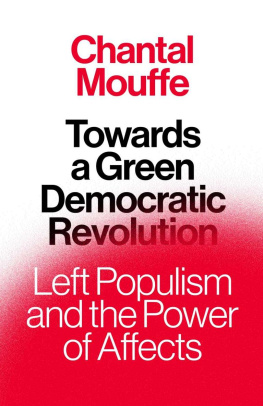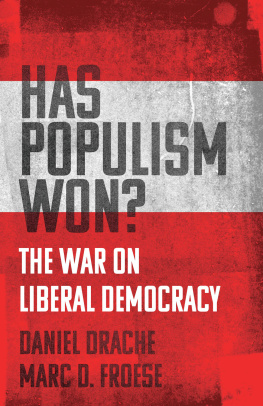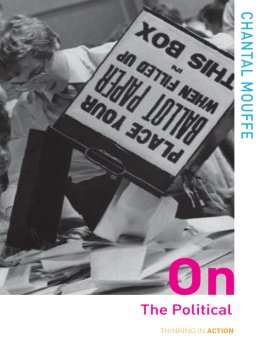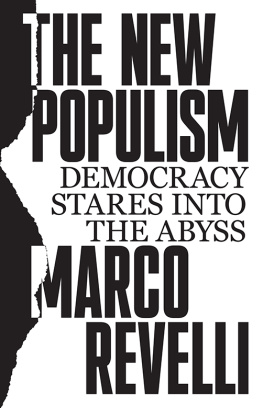For a Left
Populism
Chantal Mouffe

First published by Verso 2018
Chantal Mouffe 2018
All rights reserved
The moral rights of the author have been asserted
1 3 5 7 9 10 8 6 4 2
Verso
UK: 6 Meard Street, London W1F 0EG
US: 20 Jay Street, Suite 1010, Brooklyn, NY 11201
versobooks.com
Verso is the imprint of New Left Books
ISBN-13: 978-1-78663-755-0
ISBN-13: 978-1-78663-757-4 (UK EBK)
ISBN-13: 978-1-78663-758-1 (US EBK)
British Library Cataloguing in Publication Data
A catalogue record for this book is available from the British Library
Library of Congress Cataloging-in-Publication Data
A catalog record for this book is available from the Library of Congress
Typeset in Sabon by Hewer Text UK Ltd, Edinburgh
Printed in and bound by CPI Group (UK) Ltd, Croydon, CR0 4YY
to Ernesto
Men can second fortune, but not oppose it They can weave its warp but not break it. They should indeed never give up for, since they do not know its end and it proceeds by oblique and unknown ways, they have always to hope and, since they hope, not to give up in whatever fortune and in whatever travail they may find themselves.
Niccol Machiavelli, Discourses on Livy
Contents
At the origin of this book is my conviction that it is urgent for the left to grasp the nature of the current conjuncture and the challenge represented by the populist moment. We are witnessing a crisis of the neoliberal hegemonic formation and this crisis opens the possibility for the construction of a more democratic order. To be able to seize this opportunity, it is essential to come to terms with the nature of the transformations undergone in the last thirty years and their consequences for democratic politics.
I am convinced that so many socialist and social-democratic parties are in disarray because they stick to an inadequate conception of politics, a conception whose critique has been at the centre of my reflection for many years. This critique was initiated in Hegemony and Socialist Strategy: Towards a Radical Democratic Politics, written jointly with Ernesto Laclau and published in 1985.
What motivated us was the incapacity of left politics, both in its Marxist and social-democratic versions, to take account of a series of movements that had emerged in the wake of the 1968 revolts and that corresponded to resistances against a variety of forms of domination which could not be formulated in class terms. The second wave of feminism, the gay movement, the anti-racist struggles and issues around the environment had profoundly transformed the political panorama, but the traditional left parties were not receptive to those demands whose political character they were unable to acknowledge. It was in view of remedying those shortcomings that we decided to enquire about the reasons for such a situation.
We soon realized that the obstacles to be overcome came from the essentialist perspective dominant in left thinking. According to this perspective, that we called class essentialism, political identities were the expression of the position of the social agents in the relations of production and their interests were defined by this position. It was no surprise that such a perspective was unable to understand demands that were not based on class.
An important part of the book was dedicated to refuting this essentialist approach, utilizing insights from post-structuralism. Combining those insights with those of Antonio Gramsci, we developed an alternative anti-essentialist approach apt to grasp the multiplicity of struggles against different forms of domination. To give a political expression to the articulation of those struggles, we proposed redefining the socialist project in terms of a radicalization of democracy.
Such a project consisted in the establishment of a chain of equivalences articulating the demands of the working class with those of the new movements in order to construct a common will aiming at the creation of what Gramsci called an expansive hegemony. By reformulating the project of the left in terms of radical and plural democracy, we inscribed it in the wider field of the democratic revolution, indicating that multiple struggles for emancipation are founded on the plurality of social agents and of their struggles. The field of social conflict was thereby extended rather than being concentrated in a privileged agent like the working class. To be clear, contrary to some disingenuous readings of our argument, this does not mean we privilege the demands of the new movements at the expense of those of the working class. What we stressed was the need for a left politics to articulate the struggles about different forms of subordination without attributing any a priori centrality to any of them.
We also indicated that the extension and radicalization of democratic struggles would never achieve a fully liberated society and the emancipatory project could not be conceived any longer as the elimination of the state. There will always be antagonisms, struggles and partial opaqueness of the social. This is why the myth of communism as a transparent and reconciled society clearly implying the end of politics had to be abandoned.
The book was written in a conjuncture marked by the crisis of the social-democratic hegemonic formation established during the postwar years. Social-democratic values were being challenged by the neoliberal offensive, but they were still influential in shaping Western European common sense and our objective was to envisage how to defend and radicalize them. Alas, when the second edition of Hegemony and Socialist Strategy came out in 2000, we noted in the new introduction that in the fifteen years since its original publication, a serious regression had taken place. Under the pretence of modernization, an increasing number of social-democratic parties had discarded their left identity and had euphemistically redefined themselves as centre-left.
It was this new conjuncture that I analyzed in On the Political, published in 2005, where I examined the impact of the third way theorized in Britain by Anthony Giddens and implemented by Tony Blair and his New Labour Party. I showed how, having accepted the hegemonic terrain established by Margaret Thatcher around the dogma that there was no alternative to neoliberal globalization, her famous TINA, the new centre-left government ended up implementing what Stuart Hall has called a social-democratic version of neoliberalism. By claiming that the adversarial model of politics and the left/right opposition had become obsolete, and by celebrating the consensus at the centre between centre-right and centre-left, the so-called radical centre promoted a technocratic form of politics according to which politics was not a partisan confrontation but the neutral management of public affairs.
As Tony Blair used to say: The choice is not between a left-wing economic policy and a right-wing one but between a good economic policy and a bad one. Neoliberal globalization was seen as a fate that we had to accept, and political questions were reduced to mere technical issues to be dealt with by experts. No space was left for the citizens to have a real choice between different political projects and their role was limited to approving the rational policies elaborated by those experts.
Contrary to those who presented such a situation as progress for a maturing democracy, I argued that this post-political situation was the origin of a process of disaffection with democratic institutions, manifested in the increasing level of abstention. I also warned against the growing success of right-wing populist parties pretending to offer an alternative that gave back to the people the voice that had been confiscated by the establishment elites. I insisted on the need to break with the post-political consensus and to reaffirm the partisan nature of politics in order to create the conditions of an agonistic debate about possible alternatives.

